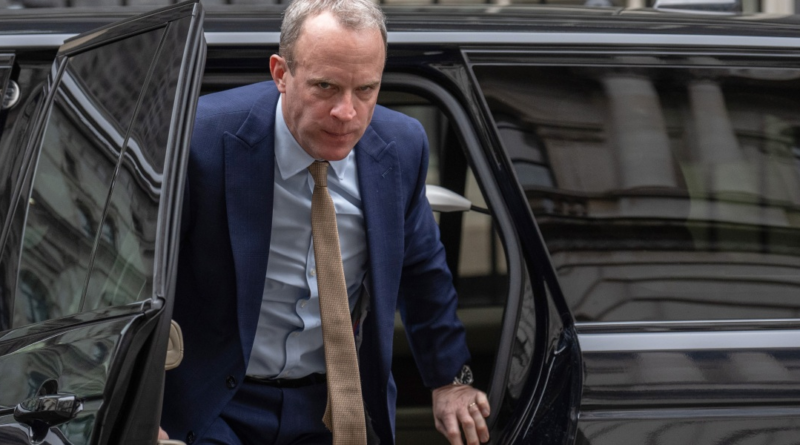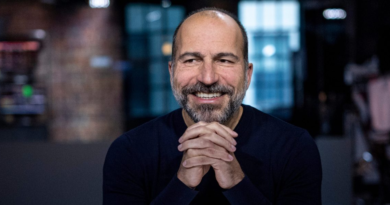A top UK official is resigning for being too much of a jerk. He called work 'utterly useless' but never raised his voice, he says.
UK Deputy Prime Minister Dominic Raab resigned after an independent investigation criticized his treatment of civil servants, the result of a months-long saga that cost Prime Minister Rishi Sunak a key ally and undermined his pledge to restore professionalism to the government.
The report Friday found that Raab was abrasive, aggressive and intimidating toward non-political officials during previous stints leading government departments. During one incident while serving as foreign secretary between 2019 and 2021, he was found to have behaved in a way that “involved an abuse or misuse of power in a way that undermines or humiliates.”
A defiant Raab, 49, denounced the investigation by an outside employment law expert as a “Kafkaesque saga,” writing in the Daily Telegraph that he was “shorn of the safeguards most people enjoy.” In his resignation letter to Sunak, he said the report set a “dangerous precedent,” but he was nevertheless “duty-bound to accept the outcome of the inquiry.”
Sunak said in his response that he accepted Raab’s resignation with “great sadness.” He later named Cabinet Office minister Oliver Dowden as his deputy and appointed Alex Chalk as justice secretary.
The resignation deprives Sunak of one of his closest allies barely six months after he took power, pledging to restore professionalism after the scandals and chaos of the Boris Johnson and Liz Truss eras. But the ruling Conservative Party needed to move on quickly before local elections are held across England in less than two weeks.
“Sunak’s only chance of closing the gap with Labour is that voters think he runs a competent government focused on their priorities,” said Luke Tryl, a former government adviser who’s now director of the More in Common research firm.
Party leaders have already warned that they could lose as many as 1,000 seats amid a cost-of-living crisis and voter dissatisfaction after 13 years of Tory rule.
‘Intimidating, Aggressive’
Employment law specialist Adam Tolley was asked by Sunak in November to look into the accusations leveled against Raab. In all, Tolley had been looking into eight formal complaints covering Raab’s tenure in three government departments that predated the Sunak administration.
In his report, Tolley said:
- At one meeting when he was foreign secretary, Raab “acted in a way which was intimidating, in the sense of unreasonably and persistently aggressive conduct.”
- In relation to the Foreign Office complaint, Raab’s conduct “involved an abuse or misuse of power in a way that undermines or humiliates.”
- Raab in his first tenure as justice secretary “was on some occasions ‘abrasive’, in the sense of a personal style which is and feels intimidating or insulting to the individual.”
- Raab described some justice officials’ work as “utterly useless” and “woeful”, but did “not intend by the conduct described to upset or humiliate.”
- Raab’s conduct as Brexit secretary “was not offensive, malicious or insulting.”
- There had been a “series of inaccurate and misleading media reports” about the probe.
- There was “no persuasive evidence” that Raab shouted at individuals, or swore at anyone.
Read the Full Investigation Report Here
Raab interpreted the report as showing “that I had not once, in four and a half years, sworn or shouted at anyone, let alone thrown anything or otherwise physically intimidated anyone, nor intentionally sought to belittle anyone.”
He apologized for “any unintended stress or offense” he may have caused, while reiterating that ministers “must be able to give direct critical feedback on briefings and submissions to senior officials, in order to set the standards and drive the reform the public expect of us.”
Nevertheless, Tolley’s findings add to the sense that a toxic atmosphere has built up between the ruling Conservative Party and the body of politically neutral civil servants that keeps government running. The FDA union of senior civil servants says one in six members reports experiencing or witnessing bullying or harassment in government departments in the past year.
“This is more than just one or two bad apples,” FDA Assistant General secretary Amy Leversidge told Bloomberg Radio on Friday. “And these behaviors becoming are more and more widespread.”
Leversidge said Johnson’s decision not to punish then Home Secretary Priti Patel in 2020 after she was found to have broken the ministerial code in her treatment of staff “created a situation where it’s a bit of a free-for-all, and ministers can see no consequences for their actions.”
Williamson, Zahawi
Raab was the second most senior member of the government, holding the joint roles of deputy prime minister and justice secretary under both Sunak and former premier Boris Johnson. He also previously served as foreign secretary and Brexit secretary.
He is the third member of the cabinet to depart under Sunak, after Gavin Williamson quit amid separate bullying allegations, and former Conservative Party chairman Nadhim Zahawi also lost his job after being found to have broken the ministerial code over statements about his tax affairs.
Raab’s departure risks angering rank-and-file lawmakers who might have preferred the government to stand up to what they see as unfair attacks by the unelected civil service. But for Tryl, “every second the Conservatives spend trying to defend Dominic Raab” risks alienating voters.
Sunak is widely expected to hold a general election in 2024, and is trying to build a narrative of competence and stability to overturn the opposition Labour Party’s double-digit polling lead.
“Downing Street would be well advised to tell grumbling backbenchers, if they want to keep their jobs next year to stop indulging in civil service bashing, accept he had to go and move on,” Tryl said.
–With assistance from Lizzy Burden and Yuan Potts.


